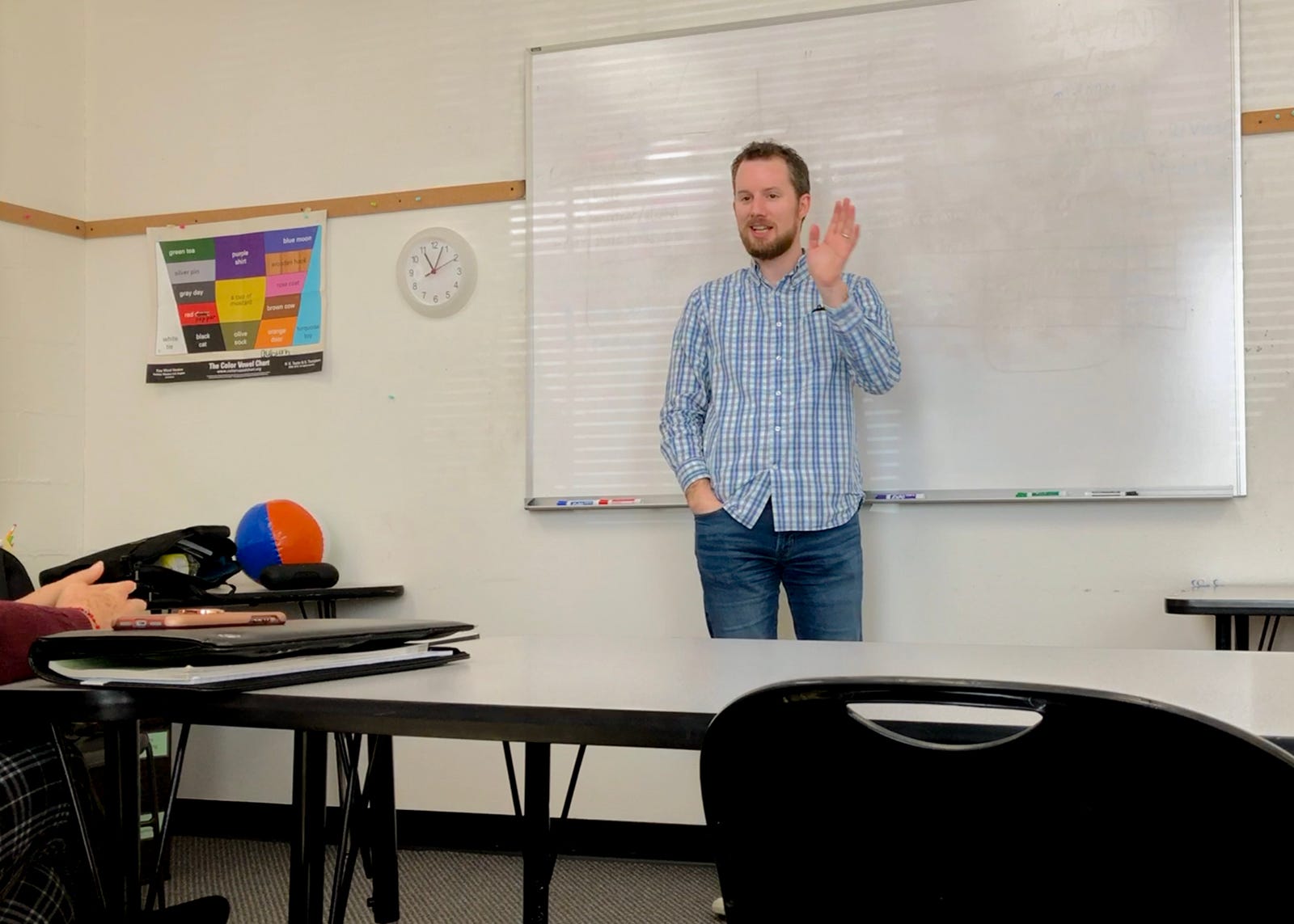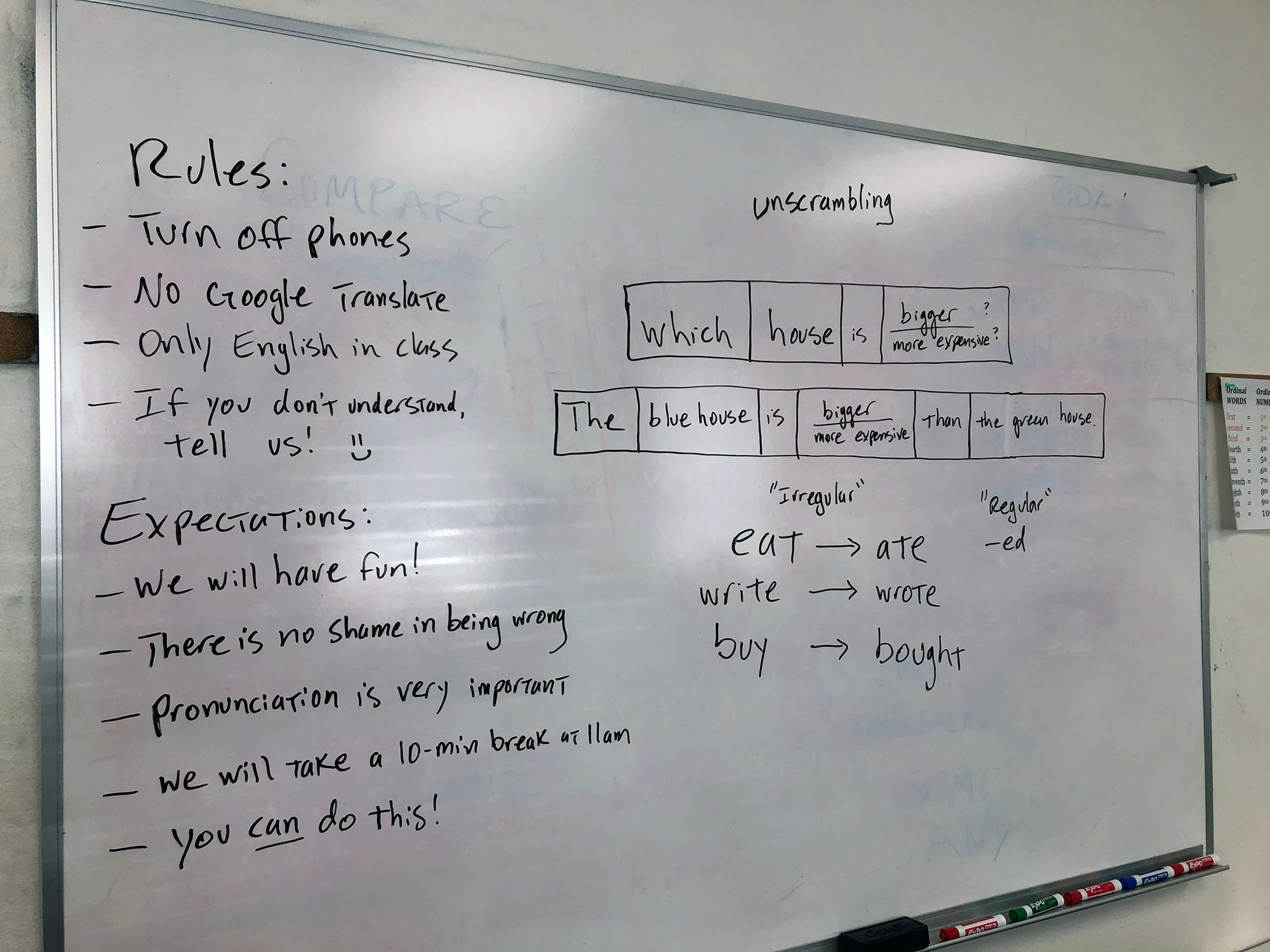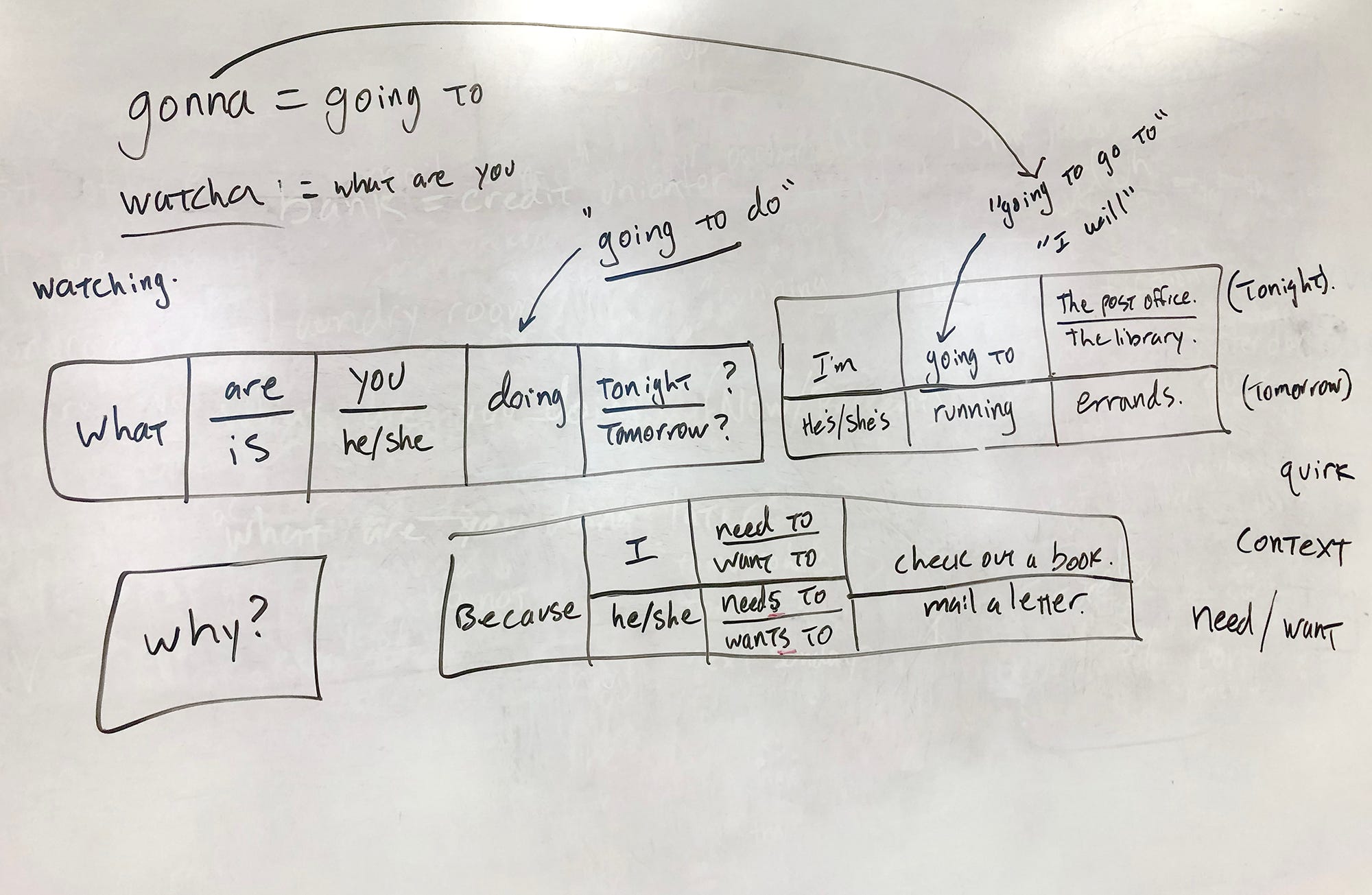Four Rules for Life I Learned From Teaching ESL
Whatever you do, don't ever say bitches when you mean beaches
When I was a volunteer ESL teacher, I always tried to enforce a set of rules and set proper expectations for the classroom that I thought were fair. My rules were clear and simple:
Turn off your phones.
No Google Translate.
Only English is spoken in class.
If you don’t understand, tell me.
I also thought my expectations for the students were fair and reasonable:
We will have fun!
There is no shame in being wrong.
Pronunciation is very important.
We will take a 10-minute break halfway through class.
YOU CAN DO THIS!
Before each class, I would write these out on the whiteboard so everyone could see them. Looking back, I think these were spot on, and I see now that they apply to a lot more than just learning English as a second language inside a classroom.
Many of these are applicable to the startups I mentor and the marketing clients I work with as well. I think a lot of times, people just need to be told (or reminded) a few basic things that are pretty obvious but are still worth repeating because we forget.
Here are a few life lessons I’ve compiled over a lifetime of being a student myself and a few years of volunteering as a mentor, teacher aide, and teacher of ESL students.
#1: If you’re going to do something hard, don’t cheat.
You’re only stealing from yourself if you cheat, especially when it comes to learning. Really, what is the point of going through a class, devoting all that time, money, and effort to learn something only to fake it?
WHY WOULD YOU DO THAT? WHAT IS THE POINT?
I was amazed at how students would sometimes be tempted to cheat just so they could get all their homework sections filled out or get a passing grade on their quizzes.
Whether I could tell or not didn’t matter. They were wasting their own time.
If you can’t do something the right way without cheating, just don’t sign up for it in the first place! Choose a more attainable goal. Find something you can be a winner at.
It’s better to be good at something simple than to try for something really hard that requires faking it in order to get by.
If you win through cheating, you will always know the truth about your stolen victory. Even if nobody else finds out, YOU will never forget.
So, if you’re taking a class, and you pass, but you cheated because you didn’t know the material, you have failed at the highest possible level. You may as well not have even taken the class in the first place.
#2: If you’re afraid to ask questions because you think you’ll look stupid, you will regret this later.
Or, to put it more directly: being afraid of looking stupid is stupider than actually looking stupid.
I cannot understand people who are so afraid of what other people think about them that they handicap themselves and their own understanding.
Ask questions. Look stupid.
The risk is worth the reward.
You know what’s really, really stupid? Having a question and also having the ability to get your question answered… but letting the opportunity pass you by.
Again, if what you’re doing is worthwhile in the first place (like learning a second language that can help you get a job), go all the way!
Do it right! Don’t cheat! Ask the questions!
As a teacher, I watched the students who sat in the back row, who timidly came to class, barely did the work, and clearly didn’t understand the material yet felt too cool to ask for help. This made me sad for them.
Really, it was no loss to me, other than that it is annoying to stare back at people in a classroom who look bored and have their arms crossed and don’t participate. But aside from that, it’s really just hurting them. Not me.
Well, it is also annoying that they’re taking up classroom space that could be better used by students who are more interested and actually want to be there.
I wanted to ask those people, “Why are you even here?”
#3: It’s okay to have fun.
I’m kind of a cranky guy when it comes to higher education. I am no fan of college and think that Higher Education™ is the single biggest enemy of real education and actual learning. To top it off, most of my teachers in life have been pretty horrible.
Worse, even if they were decent at teaching the material, a lot of them made learning boring.
THIS SHOULD BE A CRIME!
Learning should be fun, period, even if you’re learning boring crap! Especially if you’re learning boring crap!
One of the best teachers I ever had was Mr. Peterson, a wild and crazy math teacher who looked almost exactly like “Doug,” the cartoon character. He was kind of ugly and bald and wore bizarre clothes and said the wackiest things.
Mr. Peterson wrote out math problems on the whiteboard, like:
“Sarah has twice as many bedpans as Tom. Together, they have 15 bedpans. How many bedpans does each person have?”
“A biologist counts x walrii on a beach. 1 walrus swims away, and 6 walrii are left. Write this as an equation.”
“A farmer milks a badger, gathering 6 gallons of badger milk—24 quarts in total. How many gallons of badger milk are needed to make a cheese wheel requiring 18 quarts?”
“(2/3)Gosh + (1/4) = (5/6)Gosh - (3/8). Solve for Gosh.”
“Your mom weighs 1.6 times my mom’s weight. If my mom weighs 120 pounds and your mom weighs X pounds, how much fatter is your mom than my mom?”
He was hilarious. I remember SO MUCH from that class, probably more than any other math class I took, because it was FUN!
He taught us that “SOH CAH TOA” stood for “Some Old Hippie Caught Another Hippie Tripping On Acid.”
Unorthodox? Yes. Inappropriate? Maybe. Have I ever forgotten that? Never.
I never pushed anything like that, but I loved to use tongue-twisters to get the classroom all riled up.
“I scream, you scream, we all scream for ice cream” was one of their favorites. It usually resulted in explosive outbursts of laughter, both when I said it for the first time and then each time a student tried to repeat it themselves.
I tried having people say: “How much wood would a woodchuck chuck if a woodchuck could chuck wood?” but that nearly started a riot that burned the whole building down.
The students taught me one once which was totally wild: “Cuando cuentes cuentos, cuenta cuantos cuentos cuentas, cuando cuentes cuentos.” I don’t remember what it means (and don’t know that I ever did.)
What a great experience, laughing and joking and smiling and learning and sharing fun things that made memories but also taught skills.
Sometimes, it wasn’t even tongue twisters that made us roll on the floor, laughing.
Explaining to Rosa that “Bitches” and “Beaches” are two very different things that should never, ever be confused so you have to be extremely careful in the way you pronounce them was a total hoot.
Embrace the silliness! Have fun! Make learning enjoyable!
#4: If you put in the time and do the work, you will succeed.
Classroom education is very simple at a basic level. It goes like this: you want to learn a subject. You sign up for a class that teaches that subject. You go to class and learn that subject. The end result? Now you know that subject.
Bingo! It’s that easy! All you have to do in a formal educational format like this is:
Follow the rules.
Show up every single time.
Do everything you’re asked.
That’s it! If you do all the above, you will succeed. You can’t not!
If you’re using a pre-made curriculum designed to move you from point A to point B, you will increase your knowledge by default if you finish the class.
But this only works if you actually show up and put in the effort.
As a student, looking at a syllabus is one of the most amazing things my mind can comprehend. When I start a new class, I always do a little exercise to inspire myself.
I’ll look at the very end of the syllabus to see what chapter we’ll be covering during the last week of class. Then, I’ll open the textbook to the very last page of that chapter, fold over the corner of the page to bookmark it, and circle the page number.
Just look at that! From zero to page 264! It’s incredible what I’m about to do!
It is amazingly energizing to buy a new textbook for a class in a subject I know nothing or very little about, flip to the very last page that we’ll be studying, and tell myself: “By the end of this class, I will have read ALL OF THIS material. I’m going to know all or most of this in just a few weeks.”
It’s like magic. But I repeat myself: it only works this way if you stick to the plan.
Watching people in the classroom speak complete sentences in English for the first time in their lives, in front of me and their peers—all of whom were there to support them—was a truly moving experience.
And despite what you might think, even though the material was hard for everybody to learn, the success rate was NOT correlated to difficult life circumstances. The students who succeeded were the ones who simply did the work.
Nobody had a leg up: I never noticed any correlation between a student’s age, sex, marital status, apparent wealth, or employment status and their ability to succeed in class.
Some of the hardest-working students who did the best in class were working mothers of small children or grandmothers learning the language for the first time in their 60s.
Honestly, it almost seemed like the more challenging someone’s life and schedule were, the better they did in class because they worked that much harder at it.
They wanted it more, and they made it a bigger priority.
The people who failed were usually young, single, too distracted, or not committed enough to come to class on time, or they’d miss a bunch of classes and then try to catch up, but it would be too little, too late, so they’d drop out.
Cases like these made me sad because it wasted everyone’s time, especially theirs.
Also, I could almost always see failure coming because the signs were there from day one. It was like watching a train wreck in slow motion and knowing that I couldn’t stop it.
But for the people who did the work, it was life-changing. On the final day of class, when it was all said and done, we’d have a potluck, and I’d give out certificates of completion. There were definitely some teary eyes, mine included.
I love adult education. I always have, and, as someone who went to college as an adult (I graduated at age 33 with my wife and five kids watching me in the audience), I understand the struggle.
You have to want it really badly. But if you do, and you put in the time and effort, you’ll get there. Someday, the class will end, you’ll get a certificate, and you’ll smile—because you’ll know it was worth it. You succeeded.







"Well GALL-E, I dun't know!" HAHAHAHA! I think of all those silly things from Mr. Peterson's class all.the.time, and giggle every time. Hands down best teacher ever! And I love how much you love learning. I definitely didn't love it very much until very recently.